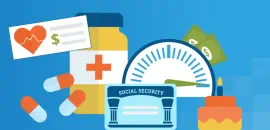

Key Takeaways
- Define your vision of early retirement and the lifestyle, location, and activities you want to pursue to shape your financial requirements.
- Create a detailed budget forecasting your expenses in early retirement, accounting for necessities, discretionary spending, and healthcare to help set savings targets.
- Prioritize maximizing retirement contributions and investing early to benefit from compound growth.
- Consider generating additional income streams through side businesses, part-time work, or other creative means to help bridge the gap to early retirement.
- Seek guidance from financial professionals to optimize your early retirement plan and navigate complex strategies and tax implications.
When it comes to retirement, everyone has different goals — including when they'd like to start their golden years. For some, early retirement can seem like a distant dream, but it may be attainable.
If you want to figure out how you may be able to retire early, you could start by defining what early retirement really means to you. Full retirement benefits traditionally kick in at age 65 for things like Social Security — but "early retirement" could mean somewhere in your 50s instead.1
Achieving Financial Freedom: Early Retirement and Its Benefits
It could also be even earlier, depending on your desires and goals. Some have managed to "retire" as early as their 30s — although part of those in this group still earn an income through hobbies or investments like rental properties. It might be helpful to think about early retirement as a different form of financial independence.
This might mean that you won't have to earn a set amount of money from a job that delivers a steady paycheck. Instead, you could be financially free to make choices that aren't dictated by working a certain job in a specific location for a certain amount of money.
Before you work toward early retirement or financial independence, consider defining what that actually looks like for you.
Consider the Lifestyle You Want
How much might you need for early retirement? Answering that question could get complicated — as you'll have to account for many more years than the average person who might plan on retiring in their 60s. The type of lifestyle you want to enjoy during your retirement will determine the kind of financial resources you will need.
For example, if you plan to spend money on a lot of travel in retirement, those additional costs might be part of your saving strategy from the start. Even if you aren't entirely sure about what you want to do in retirement , having an idea about where you might want to live and what you may want to do could help you in the future.
Forecasting Your Retirement Budget
In addition, you could narrow in on an estimated figure by forecasting a budget to help you see how much life after work might cost. It's important to account for necessary expenses and discretionary spending when considering your financial future. While this list is not all-inclusive, it could be helpful to evaluate the following:
- Rent/mortgage costs
- Living expenses – utilities, groceries, insurance premiums, health care, transportation, etc.
- Services – subscriptions, memberships, etc.
- Entertainment costs – hobbies, activities, travel, etc.
- Additional investments – buying a home, continuing education, etc.
Depending on your individual needs, there could be other categories that you also might want to consider. Some people's definition of "early retirement" might mean saving enough to get by on their current income (or less), while others might pursue a more abundant lifestyle.
Focus on Paying Yourself First
The key to building up enough savings for an early retirement could involve putting money into your retirement accounts or other savings accounts on a regular basis. Think about developing the financial discipline to contribute money to your retirement and savings accounts with every paycheck you earn. For many, the more you can afford to contribute each month, the better your chances of having enough saved for early retirement. Of course, that amount will differ from person to person according to lifestyle, location and other financial factors.
Consider New Income Streams
Early retirement doesn't have to mean you will never work again. It may just mean saving up enough to quit your job and pursue other passions that could still earn you money. After all, you might have a lot of free time if you retire early. You could make the most of it by starting a business, doing part-time work or working on a freelance/contract basis to pursue work you really love.
Creating specific income streams could also be a specific part of your plan to retire early. Many people accomplish this by purchasing properties to rent out while they're still working. An additional income stream like this could help fund your lifestyle after you retire. Think about potential income streams you could develop now or in the future — these could help shape your early retirement preparations.
Diversify your retirement income by incorporating additional revenue sources. Start Your Free Plan
Are Your Financial Ducks in a Row?
Once you've decided on your financial goals, consider how you could meet them. You could do this through saving and investing. Investing could be helpful because it gives your money the potential to earn compound interest, where the interest earned on a sum of money starts earning interest itself. The effect could be impressive, but only if there's enough time for the investment to earn interest and then compound. When it comes to investing, it could pay to start early.
Planning for Emergencies
If you're someone who has a dedicated monthly budget that you track and adjust throughout the year, then you're already practicing good money management. Monitoring your spending and how much you can save could be helpful if you're considering developing an early retirement plan. However, if you only use your month-to-month budget to project when you can retire — meaning you only account for your regular expenses right now — you may not have enough for an emergency situation or unexpected cost down the road.
Being Debt-Free
Early retirement might be less risky if you don't have financial liabilities like debt. Many people carry debt, which not only can cause a lot of stress and emotional turmoil but also could affect when you retire. That’s why it’s important to consider putting a plan in place to pay off debts like student loans. Also think about how big financial costs like home ownership fit into your early retirement goals. Having little to no debt might help extend your retirement funds.
Get Professional Support Along the Way
When it comes to early retirement planning, you don't have to do it on your own. Building a team of professionals who can offer guidance along the way — including tax and financial experts — can help you make the decisions that could make your ideal retirement possible. If you have questions, consider speaking with a financial representative about planning for retirement.
Remember to Take Care of Your Health
A lot of people focus on the financial side of retirement — for good reason — but it’s also important to think about your physical health. Keeping yourself healthy may help you avoid missing work and potential health care costs. While no one can ever make any promises about the future state of your health, doing what you can to maintain a healthy lifestyle now may lessen the risk of health problems that could throw off your early retirement plan.
If you have been thinking about how you may be able to retire early, now might be the time to start preparing. With smart saving and planning — combined with potential new income streams — you could meet your retirement goals much sooner than expected.
Maximize your savings strategy to enjoy the freedom of early retirement. Start Your Free Plan
Sources
- Starting Your Retirement Benefits Early. https://www.ssa.gov/benefits/retirement/planner/agereduction.html.





























